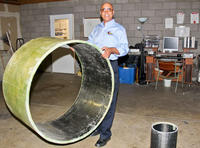-
Engineering students build U.K. first hydrogen powered locomotive
Engineering students and staff at the University of Birmingham have designed and built a prototype hydrogen powered locomotive, the first of its kind to operate in the United Kingdom
-
-
Simple new test combats counterfeit drugs in developing countries
The World Health Organization (WHO) estimates that at least 10 percent of the drug supply in developing countries consists of counterfeit medicines, causing thousands of deaths every year; many of the deaths occur among people who unknowingly take counterfeit antibiotics and anti-malaria medicines that do not contain the active ingredient to combat those diseases; in addition to lacking the active ingredient, counterfeit medicines may harm people by containing ingredients that are potentially toxic
-
-
Border Patrol kiosk detects liars trying to enter U.S.

The U.S. Customs and Border Protection (CBP) is using border crossing stations in Arizona to test new technology to detect liars as they attempt to enter the country; travelers are subjected to a 5-minute interview with the kiosk, while microphones monitor vocal pitch frequency and quality, an infrared camera monitors eye movement and pupil dilation, and a high definition camera monitors facial expression
-
-
New device dismantles pipe bombs safely, preserving forensic evidence
Thousands of pipe bombs are made each year, and thousands of pipe bomb threats are called into local police and FBI authorities across the country; many are false alarms, but those that are not can be deadly; dismantling a pipe bomb is tricky and serious business, and missteps during the dismantling process can produce catastrophic results
-
-
Geoengineering clouds to slow global warming

Researchers are taking a second look at the possibility of using futuristic ships to shoot salt water high into the sky over the oceans, creating clouds that reflect sunlight and thus counter global warming; The theory behind idea, called “marine cloud brightening,” is that adding particles, in this case sea salt, to the sky over the ocean would form large, long-living clouds
-
-
New technology combats global pandemic of drug counterfeiting
Drug counterfeiting is so common in some developing countries – in some studies, 50 percent of the drug samples from Southeast Asia have been counterfeit — that patients with serious diseases are at risk of getting a poor-quality drug instead of one with ingredients that really treat their illness
-
-
Aerospace materials for on-site building of pipes of infinite length

Concrete and steel pipes are built in short sections to fit on standard 18-wheel trucks; the heavy industrial manufacturing processes, long-distance trucking, and leak-prone joints used in steel and concrete pipe construction exact a heavy toll on the environment, not to mention bottom line; the solution: a new pipe design, consisting of a central layer of lightweight plastic honeycomb, which can be built onsite as a single section of virtually infinite length
-
-
Toilet Challenge, 1: Caltech’s solar-powered toilet wins Reinvent Toilet Challenge
The World Health Organization reports that 2.5 billion people around the globe are without access to sanitary toilets, which results in the spread of deadly diseases; every year, 1.5 million people, mostly those under the age of five, die from diarrhea; Caltech scientist awarded grant to develop solar-powered sanitation system
-
-
Toilet Challenge, 2: Loughborough’s hydrocarbonization design wins second Reinvent the Toilet Challenge prize
Researchers from Loughborough University, located in Leicestershire, United Kingdom , won second prize in the Reinvent the Toilet Challenge; their toilet uses a process called Continuous Thermal Hydrocarbonization which kills all pathogens to create safe to handle, valuable material and uses power from heat generated during processing
-
-
Toilet Challenge, 3: U Toronto wins toilet challenge third place for sand filter and UV-ray design
The U of T solution is novel in its simplicity. It uses a sand filter and UV-ray disinfecting chamber to process liquid waste and a smolder chamber, similar to a charcoal barbeque, to incinerate solid waste that has been flattened and dried in a roller/belt assembly
-
-
DHS seeks better ways to detect ultra light aircrafts used by smugglers

As the war on drugs continues with every sunrise and sunset, DHS has awarded a contract just short of $100 million for a specialized system which will be able to detect ultralight aircrafts which are used to smuggle drugs across the border
-
-
Lifelike, cost-effective robotic hand disables IEDs
Researchers at Sandia National Laboratories have developed a cost-effective robotic hand that can be used in disarming improvised explosive devices, or IEDs; the Sandia Hand addresses challenges which have prevented widespread adoption of other robotic hands, such as cost, durability, dexterity, and modularity
-
-
Unmanned sub-tracker to address a silent threat
The growing number of adversaries able to build and operate quiet diesel electric submarines is a national security threat that affects U.S. and friendly naval operations around the world; DARPA autonomous surface vessel will track and follow enemy subs for months
-
-
New system could predict solar flares, give advance warning to help protect power grids

Researchers may have discovered a new method to predict solar flares more than a day before they occur, providing advance warning to help protect satellites, power grids, and astronauts from potentially dangerous radiation
-
-
New process doubles production, slashes costs of butanol
Butanol has a 30 percent higher energy content than ethanol, lower vapor pressure, and is less volatile, less flammable, and mixes well with gasoline; a new discovery should make butanol more attractive to the biofuel industry
-
More headlines
The long view
New Technology is Keeping the Skies Safe
DHS S&T Baggage, Cargo, and People Screening (BCP) Program develops state-of-the-art screening solutions to help secure airspace, communities, and borders
Factories First: Winning the Drone War Before It Starts
Wars are won by factories before they are won on the battlefield,Martin C. Feldmann writes, noting that the United States lacks the manufacturing depth for the coming drone age. Rectifying this situation “will take far more than procurement tweaks,” Feldmann writes. “It demands a national-level, wartime-scale industrial mobilization.”
How Artificial General Intelligence Could Affect the Rise and Fall of Nations
Visions for potential AGI futures: A new report from RAND aims to stimulate thinking among policymakers about possible impacts of the development of artificial general intelligence (AGI) on geopolitics and the world order.
Keeping the Lights on with Nuclear Waste: Radiochemistry Transforms Nuclear Waste into Strategic Materials
How UNLV radiochemistry is pioneering the future of energy in the Southwest by salvaging strategic materials from nuclear dumps –and making it safe.
Model Predicts Long-Term Effects of Nuclear Waste on Underground Disposal Systems
The simulations matched results from an underground lab experiment in Switzerland, suggesting modeling could be used to validate the safety of nuclear disposal sites.
